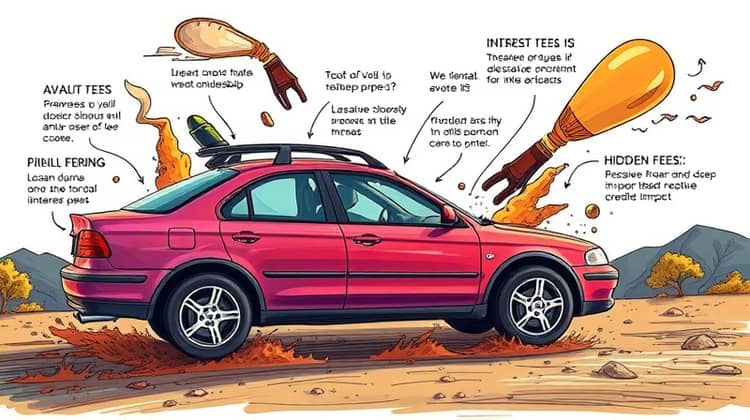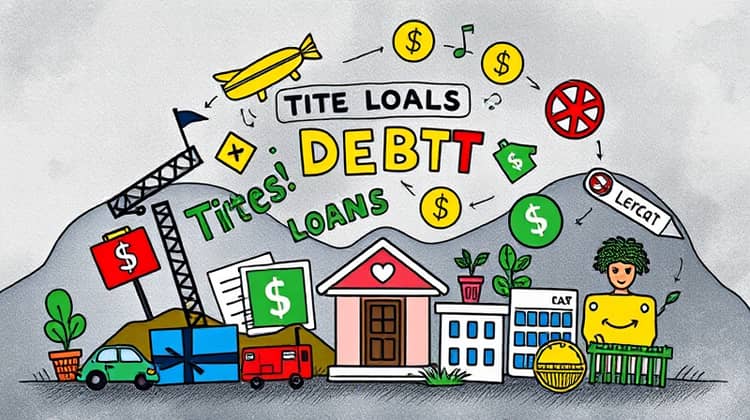Navigating financial challenges can be daunting, and for many individuals, title loans may seem like a straightforward solution. However, it's important to understand the risks associated with these loans and to explore the various alternatives available. By educating ourselves about title loans and their implications, we can make better financial decisions and avoid getting trapped in a cycle of debt.
In this article, we will define what title loans are, discuss the risks involved, and offer alternatives that can help you tackle your financial struggles more effectively. From personal loans to local assistance programs, there are many options to consider instead of relying on title loans.
What are Title Loans?

Title loans are short-term loans that allow borrowers to use their vehicle's title as collateral. This means that the lender holds the title until the loan is repaid, which can be appealing for those in immediate need of cash. The loan amount is typically based on the value of the vehicle, and the repayment period can range from a few weeks to a month.
Though they can provide quick access to funds, title loans come with high interest rates and fees. Borrowers may find themselves in a difficult situation if they are unable to repay the loan on time or if they roll over the loan multiple times to avoid repossession. This can lead to a debt trap that is hard to escape.
- Quick access to cash
- Requires only the vehicle title as collateral
- Minimal credit checks are usually conducted
Overall, while title loans can provide immediate financial relief, the risks often outweigh the benefits, making it essential for potential borrowers to explore other options before proceeding.
The Risks of Title Loans

Title loans can appear to be an easy solution to financial issues, but they come with significant risks that can lead to more severe problems down the road.
- High-interest rates that can exceed 300% APR
- Risk of losing your vehicle if you default on the loan
- Potential for additional fees if the loan is rolled over
- Difficulty in repaying due to short repayment periods
- Negative impact on credit score if default occurs
Ultimately, the risks associated with title loans may cause more harm than good, and individuals should carefully weigh these factors before deciding to proceed with a title loan agreement.
Alternatives to Title Loans

When faced with sudden financial needs, it's crucial to explore alternatives to title loans that may offer more favorable terms and conditions. Many options are available to help borrowers avoid the traps associated with title loans.
These alternatives can provide individuals with financial relief without the high stakes that come with pawning their vehicle title.
1. Personal Loans
Personal loans are an excellent alternative to title loans, offering individuals a way to borrow money without collateral. Most banks, credit unions, or online lenders provide personal loans with varying interest rates and repayment terms.
Unlike title loans, personal loans typically have lower interest rates (though this can vary based on creditworthiness), and they allow borrowers to repay over a longer period, making them a more manageable choice. Based on the lender, you might be able to borrow from a few hundred dollars to several thousand.
- Lower interest rates than title loans
- Flexible repayment periods
- No collateral is required
- Can improve credit score if repaid on time
- Various lenders offer different terms and conditions
Overall, personal loans can present a more sustainable and sensible financial solution when faced with unexpected expenses.
2. Credit Cards
If you're facing short-term financial challenges, using a credit card can be one potential way to cover expenses. Many credit cards offer a grace period where no interest is charged if the balance is paid in full by the due date, making them a viable alternative to title loans for those who are disciplined with their payments.
However, it's vital to utilize credit cards responsibly to avoid accumulating debt. Only charge what you can afford to pay back within that timeframe, and be mindful of your credit utilization ratio as it affects your credit score.
- Quick funds if you have credit available
- Potential for rewards or cashback on purchases
- No risk of losing collateral like a vehicle
In summary, credit cards can serve as a useful tool for managing finances, enabling individuals to cover unexpected bills without the risks of title loans, provided they use them wisely.
3. Borrowing from Friends or Family
Turning to friends or family for financial help is often overlooked but can be a pragmatic approach. These individuals may be more willing to lend without charging interest or imposing strict repayment deadlines. Just ensure that both parties are clear about the terms of the loan to avoid misunderstandings.
Being upfront about your situation and making a repayment plan can help maintain the relationship and prevent potential conflicts in the future.
4. Local Assistance Programs
Various nonprofit organizations and community programs can provide financial assistance for those struggling with bills, rent, or other essential expenses. Many local governments also have financial aid programs designed to assist those in need.
Researching and applying for these programs can help you avoid taking out a perilous title loan and instead find ways to obtain the necessary financial support.
5. Refinancing Your Vehicle
If you have an existing car loan, refinancing can be another alternative to relieve financial pressure. You may secure better terms, including a lower interest rate or extended repayment period, which can reduce your monthly payments.
This approach can help free up cash flow while retaining ownership of your vehicle, providing a more stable financial path.
How to Avoid the Title Loan Trap

Those in financial distress must stay informed and cautious when exploring lending options. Title loans, while seemingly simple, can lead to a precarious financial situation if not approached thoughtfully. Prior preparation and understanding of your financial needs are essential to avoid adverse outcomes.
Establishing a budget to recognize your borrowing capacity can be invaluable in preventing the need for a title loan in the first place. Understanding how these loans function and their potential ramifications can help prepare individuals better.
- Create a budget to determine your financial needs
- Consider alternatives before applying for a title loan
- Look for reputable lenders with transparent terms
- Educate yourself about loan agreements and repayment terms
- Seek financial counseling if needed
In conclusion, avoiding the title loan trap involves careful planning, education, and consideration of alternative financing options to protect your financial future.
Conclusion

Understanding the intricacies of title loans is crucial for making informed financial choices. The risks often overshadow the short-term relief they provide, leading to a cycle of debt that can be challenging to escape. Exploring healthier alternatives is essential for financial stability.
By considering options like personal loans, credit cards, or local assistance, individuals can find more effective ways to address their financial needs without jeopardizing their vehicles or future.














